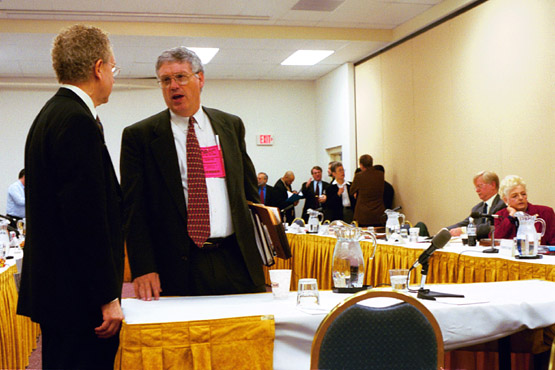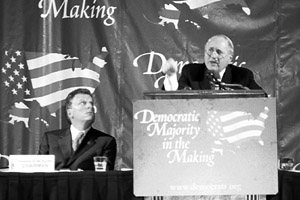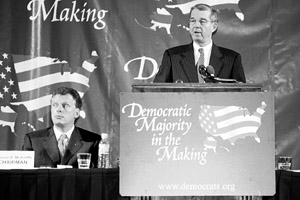
Rules and Bylaws Committee member John Willis and Joe Carmichael talk after the Jan. 18 meeting.
Before the full DNC approved the rules, however, the Rules and Bylaws Committee, meeting on Jan. 18, 2002, heard from two party members opposed to them and held further discussion. Chuck Ross, national committeman from Vermont, urged the Rules and Bylaws Committee to reconsider the rules so that "voices of Democrats from smaller states" are not diminished. Mark Brewer, committee member and chair of the Michigan Democratic Party, proposed an amendment, seconded by Ohio Democratic Party chair David Leland, to end the "unfair monopoly" of Iowa and New Hampshire. Brewer argued that the special privileges granted the two states "violate the very charter of our party." "Tradition in a democracy must yield to fairness and equal treatment," Brewer said. John Willis, committee member and Maryland Secretary of State, noted for the record that the National Association of Secretaries of State's proposal for a rotating regional primary remains an option for the future. However, Harold Ickes, captured the sense of the committee when he said any proposals for change were "coming very late in the game" and that "people want to get this settled."

|
|
 |
 |
Note
The Democrats' move prompted
some sharply unfavorable editorial comment. The Los Angeles Times
termed the plan "Primarily, a Bad Idea." The New York Times
(Jan. 6, 2002) proclaimed that, "The nation is moving toward the worst
possible scenario -- one big, diffuse presidential primary held in the
dead of winter, where only the candidates with large amounts of ready cash
need apply." USA Today columnist Walter Shapiro (Jan.
16, 2002) opined, "The real losers under the Democrats' new calendar
are not the candidates but the electorate."
Copyright 2002 Eric M. Appleman/Democracy
in Action